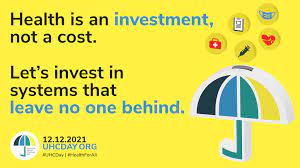Universal Health Coverage Day 2021: “Protect and invest in health and care workers”
Providing health services to all
On December
12, 2012, the UN General Assembly (UNGA) endorsed a resolution urging countries
to accelerate progress towards universal health coverage – the idea that
everyone, everywhere, should have access to quality, affordable healthcare – as
an essential priority for international development.
On December
12, 2017, the UN proclaimed ‘December 12’ as International Universal Health
Coverage Day by resolution . ‘Provision of universal health coverage’ has
also been included in Sustainable Development Goals (SDGs) for the 2015-2030
period.
COVID-19 has
severely disrupted progress in all areas of health and reminded us of the
urgent need for coordinated action and strong health systems. Even before the
pandemic, the number of people with catastrophic health spending was on the
rise, the pandemic has only aggravated this trend.
The
universal healthcare agenda can well address the barriers to access and improve
the quality of care across all areas by avoiding catastrophic spending,
ensuring more integrated coverage and encouraging governments to deliver
services based on the principles of human rights and equity.
Health is a basic human right. Providing health facilities to all the citizens is the responsibility of every state. Universal Free Health Care System and service is a popular idea throughout the world. Free Universal Health Care service was integral part of Social Democratic welfare state established in most Western countries after the second world war.
Our health system is still at the tail end of the developed health system. An efficient, well functional and fully integrated health system is not seem our priority. We are not investing enough into our health system to provide every citizen with basic health facilities and services.
If we look at
the numbers, we will find that we don’t stand anywhere in the first 50. The
reasons for this sorry state are chronic misgovernance, bad policies, neglect and other managerial,
financial and implementation issues.
All successive regimes have their share in the undue neglect of the health sector. Our budgetary allocation for healthcare couldn’t rise above one percent. This apathy to the health sector dented public trust in the services provided by state-run facilities and the majority tilted towards the private sector.
This
big patient thrust on the private sector has its toll too, resulting in high
service charges, poor quality and malpractices. Unfortunately, the health
sector regulatory mechanism, especially the private one, is far from
satisfactory for obvious reasons, hence the plight continued.
Many countries have a single-payer healthcare system that is universal and state-funded. The government removes all competition in the market to keep costs low and standardise benefits. The health ministry controls what healthcare providers do and what they charge. Funded by taxes, there are no out-of-pocket fees for patients or any cost-sharing. This is called Free universal health care system.
The Editor













Post a Comment